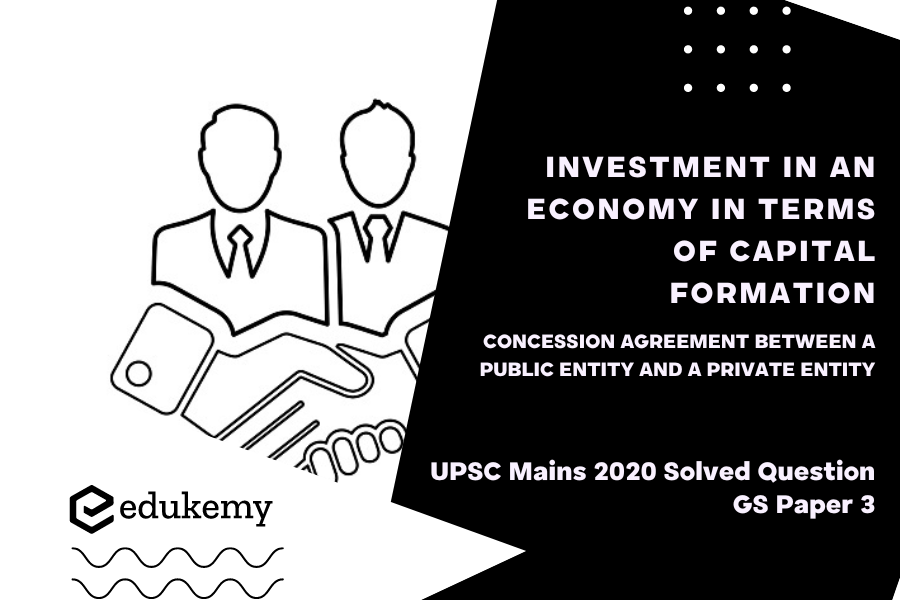
Investment plays a pivotal role in the economic development of a nation, catalyzing capital formation. In the context of an economy, investment refers to the allocation of resources, both financial and non-financial, to generate future returns. Capital formation, a crucial aspect of economic growth, involves the accumulation of physical and human capital through investments in infrastructure, technology, and education. These investments contribute to the expansion of a nation’s productive capacity, fostering long-term prosperity. When exploring the dynamics of investment, particularly in public-private partnerships, the design of concession agreements between public entities and private partners becomes paramount. Such agreements delineate the terms and conditions under which private entities operate public infrastructure or services. Crafting a concession agreement requires careful consideration of various factors, including the distribution of risks and rewards, regulatory frameworks, and the alignment of interests between the public and private stakeholders. These elements collectively shape the success and sustainability of investments, ensuring that they contribute effectively to the overall economic well-being of a nation.
UPSC Mains General Studies Paper – 3 Mains 2020
Indian economy and issues related to planning, mobilization of resources, growth development and employment. Investment Models.
UPSC Mains Civil Services IAS Exam Question Paper – 2020
Contents
- 1 Decoding the Question
- 2 Answer
- 3 Conclusion
- 4 Frequently Asked Questions (FAQs)
- 4.1 1. What is the significance of investment in the context of capital formation?
- 4.2 2. How does investment contribute to the creation of physical and human capital?
- 4.3 3. What role does investment play in fostering innovation and technological progress?
- 4.4 4. How does foreign direct investment (FDI) impact capital formation in an economy?
- 4.5 5. Can government expenditure be considered a form of investment in terms of capital formation?
Decoding the Question
- In Intro try to define investment and capital formation.
- In Body,
- Discuss factors to be considered while designing concession agreements.
- Conclusion – Conclude as per context.
Answer
Introduction
An investment is an asset or item acquired to generate income or appreciation. Investment is elucidated and defined as an addition to the stockpile of physical capital such as machinery, buildings, equipment, roads, etc. Capital formation is a term used to describe the net capital accumulation during an accounting period for a particular country. The term refers to additions of capital goods, such as equipment, tools, transportation assets, and electricity. Generally, the higher the capital formation of an economy, the faster an economy can grow its aggregate income.
Economic Impact of Investment:
- Investment leads to the addition of capital stock in the economy.
- It enhances the production capacity of the economy.
- The more the production, the more will be the gross domestic product (GDP).
- In the later stage, it may also encourage domestic savings.
A concession agreement is a negotiated contract that grants rights to a company by a government, local authority, or other legal entity. It means a Public-Private Partnership (PPP) which allows joint development and maintenance of government projects.
Factors to be considered while designing concession agreement between public entity and private entity
- Period: While considering a concession agreement the period of project completion is a very crucial factor. The time is central in deciding the cost of the project as well as the feasibility of the project from a financial point of view.
- Contract Enforcement: Effective contract enforcement is very significant because in India registering property and actual enforcement of contracts take a long time and this increases the cost of the project. Hence Contract enforcement is another factor considered.
- Service Delivery: Service delivery on time and an effective targeted delivery system is another factor to be considered. Especially after the completion of infrastructure development projects like roads, timely maintenance is a very significant factor in deciding concession agreements.
- Effective Resource Utilization: Resource utilization is very significant in the development of the country. This is one of the significant factors in deciding a concession agreement between both parties. Effective use of resources may reduce wastage in a very significant manner.
- Comparative Advantage: A private entity has comparative advantages as compared to a public entity. This comparative advantage of private entities is a very important factor when considering concession agreements.
Conclusion
Therefore, the concession agreement should be based on best International practices, and policies and regulations must be focused on addressing all the complexities so that and balance between both entities can be improved. Concession agreements are of fundamental importance for the development of infrastructure in the country. It has reduced the time lags and costs involved in undertaking such agreements. Therefore, a well-designed concession agreement will not only help in performance improvement but also help in reducing contract disputes.
Frequently Asked Questions (FAQs)
1. What is the significance of investment in the context of capital formation?
Investment plays a crucial role in capital formation by channeling funds into various assets such as machinery, infrastructure, and technology. This process contributes to the expansion of the productive capacity of the economy, leading to increased output and economic growth.
2. How does investment contribute to the creation of physical and human capital?
Investment involves not only the acquisition of physical assets like machinery and buildings but also in human capital through education and training. These investments collectively enhance the overall productive capacity of the economy by fostering technological advancements and a skilled workforce.
3. What role does investment play in fostering innovation and technological progress?
Investment in research and development, as well as the adoption of new technologies, is a key driver of economic growth. By allocating resources to innovation, businesses, and industries can enhance productivity and stay competitive, contributing to the overall advancement of the economy.
4. How does foreign direct investment (FDI) impact capital formation in an economy?
Foreign direct investment involves capital inflows from overseas investors, contributing to capital formation in the host economy. This influx of foreign capital can lead to the development of new industries, job creation, and the transfer of technology, thereby enhancing the overall capital stock.
5. Can government expenditure be considered a form of investment in terms of capital formation?
Yes, government spending on infrastructure, education, and healthcare can be viewed as a form of investment. These expenditures contribute to the creation of both physical and human capital, positively impacting the economy’s long-term productivity and growth prospects.

For UPSC Prelims Resources, Click here
For Daily Updates and Study Material:
Join our Telegram Channel – Edukemy for IAS
- 1. Learn through Videos – here
- 2. Be Exam Ready by Practicing Daily MCQs – here
- 3. Daily Newsletter – Get all your Current Affairs Covered – here
- 4. Mains Answer Writing Practice – here
Visit our YouTube Channel – here

